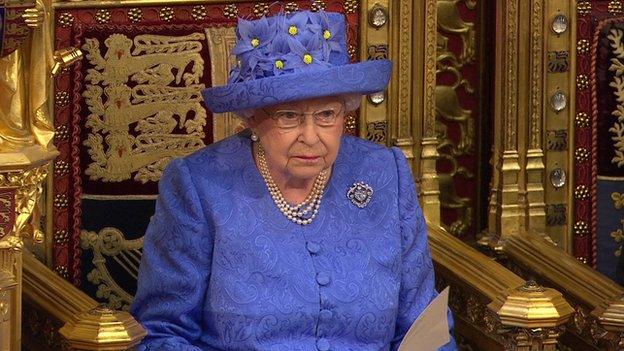Spaceplanes, Brexit and cutting Wales Office ministers
- Published
- comments

The Queen - without her crown - reads her speech at the state opening of Parliament from the throne in the House of Lords.
It's not quite the same without all the pomp and ceremony.
But then politics isn't quite the same any more. And this Queen's Speech - the first from a minority government since 1978 and the first "dressed-down" ceremony since 1974 - is rather different from the norm.
It is designed for a two-year session of parliament and dominated by Brexit.
I've been ploughing through the speech and the government's background notes in search of Welsh angles.
As the prime minister points out: "The majority of the Bills in the programme will apply across the UK in full or in part."
'Bonds'
The Queen said: "A priority will be to build a more united country, strengthening the social, economic and cultural bonds between England, Northern Ireland, Scotland and Wales.
"My Government will work in cooperation with the devolved administrations and it will work with all of the parties in Northern Ireland to support the return of devolved government."
Warm words on a very warm day but what do they mean? In her foreword to the background briefing on the speech, Theresa May said: "This government will do everything in our power to build a more united nation and strengthen our precious union of England, Scotland, Wales and Northern Ireland. We will take seriously our responsibility to govern for the whole United Kingdom and will see to work closely with the devolved administrations."
'Crisis'
What could possibly go wrong? The Welsh first minister is already warning of a "constitutional crisis" if the UK government "disrespects" devolution. (The first minister will also be interested in the views of 50 Labour politicians, external who reject the party leadership's acceptance that the UK is leaving the single market and argue that access to the single market is inferior to membership.)
There will be flashpoints as the Repeal Bill makes its way through parliament. The UK government says it will be "maintaining the scope of devolved decision-making powers immediately after EU-exit. This will be a transitional arrangement to provide certainty after exit and allow intensive discussion and consultation with devolved administrations on where lasting common frameworks are needed."
An Agriculture Bill has the aim of "establishing new national policies on ... agriculture". The government says it will "consult widely with the devolved administrations on the appropriate extent of any legislation".
The prime minister highlighted a potentially less controversial piece of legislation that will affect Wales: "Amongst many other things, the contents of the programme will support the burgeoning aerospace industry in Wales."
The Space Industry Bill will feature "new powers to license a wide range of new commercial spaceflight, including vertically-launched rockets, spaceplanes, satellite operation, spaceports and other technologies."
Minister cut
Welsh political anoraks will be disappointed by the absence of a Wales Bill. Some of us are still struggling to fill the void left by the passage of the Wales Act (2017).
One of the key players during that legislation, Lord Bourne of Aberystwyth, has been moved on to other things. He's now a Northern Ireland Minister (and keeps his existing role as minister for faith and integration at the Department for Communities and Local Government).
He's not been replaced at the Wales Office, which now has two ministers instead of three. It's not unusual for the Wales Office not to have a Lords minister - it didn't have one before 2012 - but the decision to cut the number of Welsh ministers will raise eyebrows coming from a prime minister determined to strengthen "our precious union".
Oh, and if you're wondering why scrapping Severn Bridges tolls didn't feature in the speech it's because ministers say they will scrap them through secondary legislation.